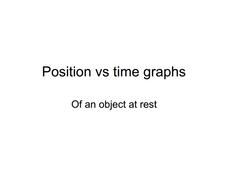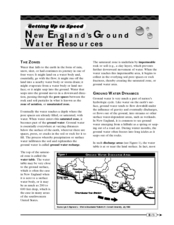Chemical Education Foundation
Teacher's Guide to Science Projects
Do you find the idea of having a science fair with all of your students intimidating? Use a guide that provides everything you need to know to make project-based learning manageable. The resource includes options for four...
Curated OER
How To Make a Science Concept Map
Here is a clever way to get your pupils thinking about a science topic they'd like to research for a report, or a project they'd like to do for a science fair. The three-step process is easy to follow, and it really should help your...
Minnesota Literacy Council
Scientific Method
Here is a resource with a descriptive approach to explaining the scientific method. It's simple, but effective for both introduction and reinforcement of this concept.
Curated OER
Steps of the Scientific Method
Steps of the scientific method are summarized, and then an example experiment is presented to allow practice identifying the steps. The graphics and animations are a little blurry, but this otherwise well-formulated presentation will...
Curated OER
Absorbancy: What does it mean?
Define the scientific concept of absorbency as it relates to the properties of matter, then conduct an investigation. Learners answer several questions, then investigate the absorbency of several different types of towels. Tip:...
Curated OER
Position vs. Time Graphs of an Object at Rest
The presentation includes nine time vs. position graphs. The first three are meant to be used for teaching how to read them. The next three provide an opportunity for students to practice reading them, while the last three display the...
Environmental Protection Agency (EPA)
New England's Ground Water Resources
Learn all about where ground water is stored, how it moves, and how it is accessed in a detailed and thorough 10-page reading. Whether supplementing reading for an existing environmental or earth science course or providing background...
Curated OER
Planning a Scientific Investigation
This slide show provides an opportunity of you and your class to plan your own scientific investigation. Each slide contains one part of the scientific hypothesis-building process and a space to type in what the class chooses to focus...
Curated OER
Room Temperature Investigation
While the topic of this investigation is not specific to any particular discipline of science, it does serve as a practice of the scientific method. Learners set up a bowl containing boiling water, one with room temperature water, and...
Curated OER
Which Material is Best for Muffling Sound?
Two professors, Big-Hair and Bee-Hive, cannot do their work because the alarm clock won't stop ringing! Young scientists perform an experiment to help them wrap the clock in the best material for muffling the sound. This is a clever...
Curated OER
Sports Challenge! Mr. D's Team
This PowerPoint provides a game board similar to Jeopardy filled with questions and answers related to science. The categories from which the teams choose are weather, water cycle, clouds, and space.
Curated OER
Springs
Springs are amazing. Here, learners are presented with springs found in various everyday objects. They discuss which springs they think will have the most force, then test their hypothesis. This presentation has the start of a good idea...
Curated OER
Understanding Weather
A succinct set of slides covers the main points for your weather unit. From the factors that contribute to conditions, to fronts and extreme occurrences, to the different types of clouds, numerous facts are listed in bullets. The only...
Curated OER
Metals in Industry, Working with Metals
How is iron is extracted from it ore and then combined with other materials to produce steel? That question is answered in the presentation. Also covered is how titanium and aluminum are used in manufacturing. This is a compact lesson...
ARKive
Darwin and Natural Selection
A presentation on Darwin's theory of evolution and natural selection could be a good addition to your biology class. It provides general information about how animals adapt to their surroundings, as well as how organisms create more...
Biology Junction
Water Properties and More
Did you know many insects use cohesion or surface tension to walk on water? Using a presentation, scholars learn the more important properties of water. It extends into the concepts of solutions, suspensions, pH, and more.
Music Publishers Association of the United States
I Made It. I Own It. Please Don't Steal It.
Explore the world of copyright law with a variety of activities to instill the importance of respecting creative property. Scholars watch an animated tale then take part in a grand conversation detailing the video's main idea, details,...
Teach Engineering
Where Are the Plastics Near Me? (Mapping the Data)
The last activity in a nine-part series has teams create a Google Earth map using the data they collected during a field trip. Using the map, groups analyze the results and make adjustments to the map to reflect their analysis. A short...
Curated OER
Problem Solving - Draw a Diagram
There is an excellent strategy for learners to use when faced with a word problem that uses fractions. This presentation shows how to draw a diagram of the fractions in the problem in order to get a visual representation. Although brief,...
Curated OER
Revolutions in Latin America (19c - Early 20c)
The history of the Latin American revolutions - and the philosophies behind them - is the focus of this comprehensive presentation. From the theories of the European Enlightenment, to the Revolutionary Wars of America and France, Latin...
ProCon
Standardized Tests
Does the use of standardized testing improve American education? Scholars dive into the issue as they prepare to discuss the debate topic with their classmates. After reviewing the pros and cons, they watch videos to help them arrive at...
American Geosciences Institute
American Geosciences Institute: Science Fair Project
A complete guide to carrying out the most successful science fair project. Includes graphic organizers for planning.
Other
Youth Science Canada: Science Fair Resources: Smarts Mentorship Guide [Pdf]
Students can find a guide that explains how to find a mentor who is willing to help them develop a successful science fair project.
University of Southern California
California State Science Fair: What Makes a Good Science Fair Project?
A good first step to read. This set of recommendations or advice comes from the California State Science Fair Committee. Read carefully the first three paragraphs and the "Students are advised" paragraph.
Other popular searches
- Science Fair Projects
- Science Fair Project Ideas
- Science Fair Project Data
- Tsunami Science Fair Project
- Science Fair Topics
- Science Fair Projects Ideas
- Science Fair Ideas
- Science Fair Experiments
- Science Fair Project Topics
- Science Fair Exhibit
- Science Fair Presentations
- Rockets Science Fair Project






















![Youth Science Canada: Science Fair Resources: Smarts Mentorship Guide [Pdf] Handout Youth Science Canada: Science Fair Resources: Smarts Mentorship Guide [Pdf] Handout](http://content.lessonplanet.com/resources/thumbnails/410021/large/bwluav9tywdpy2symdiwmduymc0yndm2nc1lcnronnyuanbn.jpg?1589984823)
